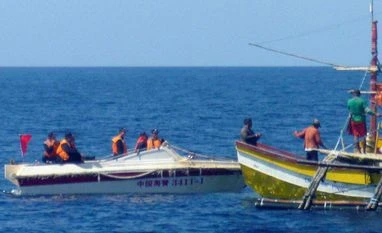A Taiwanese warship set sail for the South China Sea today "to defend Taiwan's maritime territory", a day after an international tribunal ruled China has no historic rights in the waterway and undermined Taipei's claims to islands there.
President Tsai Ing-wen rallied troops on the deck of the frigate, saying Taiwanese were determined to "defend their country's rights", before the warship headed for Taiwan-controlled Taiping island in the Spratly island chain from the southern city of Kaohsiung.
The Permanent Court of Arbitration in the Hague ruled Tuesday that China has no historic rights to its claimed "nine-dash line" and that it had violated the Philippines' sovereign rights in the exclusive economic zone.
Taiwan's government said the ruling was "completely unacceptable" and had no legally binding force since the arbitral tribunal did not formally invite Taipei to participate in its proceedings or solicit its views.
"The South China Sea ruling, especially the categorisation of Taiping island, has severely jeopardised our country's rights in the South China Sea islands and their relevant waters," Tsai told soldiers on the deck of ship in footage broadcast by news channels.
"This patrol mission will show Taiwanese people's determination to defend their country's rights," she said, before disembarking from the warship ahead of its departure.
The defence ministry vowed to "firmly defend Taiwan's territory and sovereignty" and said there would be no change to Taiwan's claims in the strategic seas because of the ruling.
It brought the deployment of the warship forward by a day in reaction to the ruling.
The ministry said in a statement it would continue to send aircraft and ships for patrol missions to the region and remain "highly vigilant" to protect national security.
Tsai's predecessor Ma Ying-jeou visited Taiping in January to press Taiwan's claims and show that Taiping is an island, not a rock, in a move that triggered criticism from the United States as well as protests from Vietnam and the Philippines.
The Spratlys are also claimed in part or whole by China, Vietnam, the Philippines, Malaysia and Brunei.
President Tsai Ing-wen rallied troops on the deck of the frigate, saying Taiwanese were determined to "defend their country's rights", before the warship headed for Taiwan-controlled Taiping island in the Spratly island chain from the southern city of Kaohsiung.
The Permanent Court of Arbitration in the Hague ruled Tuesday that China has no historic rights to its claimed "nine-dash line" and that it had violated the Philippines' sovereign rights in the exclusive economic zone.
More From This Section
Crucially for Taipei, it ruled that Taiwan-administered Taiping, the largest island in the Spratlys chain, was legally a "rock" that did not give it an exclusive economic zone, undermining Taiwanese claims to waters surrounding the island.
Taiwan's government said the ruling was "completely unacceptable" and had no legally binding force since the arbitral tribunal did not formally invite Taipei to participate in its proceedings or solicit its views.
"The South China Sea ruling, especially the categorisation of Taiping island, has severely jeopardised our country's rights in the South China Sea islands and their relevant waters," Tsai told soldiers on the deck of ship in footage broadcast by news channels.
"This patrol mission will show Taiwanese people's determination to defend their country's rights," she said, before disembarking from the warship ahead of its departure.
The defence ministry vowed to "firmly defend Taiwan's territory and sovereignty" and said there would be no change to Taiwan's claims in the strategic seas because of the ruling.
It brought the deployment of the warship forward by a day in reaction to the ruling.
The ministry said in a statement it would continue to send aircraft and ships for patrol missions to the region and remain "highly vigilant" to protect national security.
Tsai's predecessor Ma Ying-jeou visited Taiping in January to press Taiwan's claims and show that Taiping is an island, not a rock, in a move that triggered criticism from the United States as well as protests from Vietnam and the Philippines.
The Spratlys are also claimed in part or whole by China, Vietnam, the Philippines, Malaysia and Brunei.
)